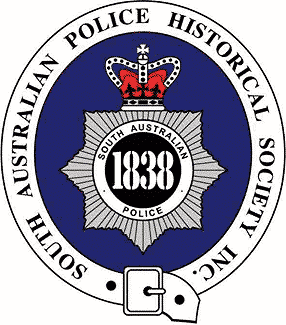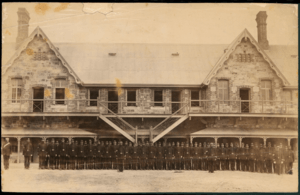South Australia Police Historical Society facts for kids
 |
|
| Established | 1977 |
|---|---|
The South Australia Police Historical Society is a group of volunteers. They work to save and share the history of the South Australia Police. This includes how police work has changed in South Australia over time. The society helps everyone learn about the important role of police in the community.
Contents
How the Society Started
Founding the Society in 1977
The society began in 1977. For many years, it had rooms at the old Mounted Police Barracks. This was on North Terrace in Adelaide. Later, from 1996, it moved to the former Thebarton Police Barracks. This site was on Gaol Road in Adelaide. It was part of Park 27 in the Adelaide Park Lands.
New Home for the Museum
In 2024, the society and its museum moved again. Their new home is at the old AAMI state office. This building is on the corner of King William Street and Sturt Street. The move happened after some old buildings were taken down. These buildings made way for the new Women's and Children's Hospital.
Working with Police and the Community
The society works closely with the South Australia Police (SAPOL). Since it started, the main police leader, called the Commissioner of Police, has been an honorary patron. This means they support the society. Anyone can join the society, whether they are police or not.
What the Society Does
Preserving Police History
The society focuses on keeping records and sharing the history of the South Australia Police. They show how police have helped the community. Monthly meetings often have guest speakers. These speakers talk about interesting police topics.
Celebrating Police Foundation Day
Police Foundation Day is a special event. It happens every year on April 28. This day remembers when SAPOL first started in 1838. It is an important date for police history.
Exploring the Museum's Collections
At its old home, the museum had five different areas. These areas showed police items and uniforms from long ago and today. One area had a collection of police vehicles. You could see how police transport changed over time. Another area showed a plaster cast from 1949. This cast was of an unknown man's head and chest. It was from a famous old case.
Other Activities and Support
The society also keeps many old photos and documents. They have a library full of police history. They hold an annual open day for visitors. They also go to community events. Sometimes they do re-enactments to support local police. The society can help people research police officers or stations. They charge a small fee for this service. This group is not for profit. They get most of their money from museum tours and selling books.
Unique Facts About South Australia Police
The First Police Force for a Whole Colony
The South Australia Police (SAPOL) started on April 28, 1838. Inspector Henry Inman was in charge. While other Australian police groups existed, SAPOL was the first to cover an entire colony. This makes it one of the oldest police forces in the world. Only the London Metropolitan Police (1829) and Dublin Police (1836) are older.
Gold Escorts and Economic Boost
From 1852 to 1853, SAPOL ran a special service. They escorted gold from the Victorian goldfields to Adelaide. This "Gold Escort" helped South Australia's economy a lot. It brought money and goods into the colony.
Camels in the Outback
In 1880, SAPOL was the first Australian police force to use camels. They used camels regularly for patrols in the tough outback. Camels, horses, and later cars, were used until 1951.
Pioneering Women Police
SAPOL also had the first women police in the British Empire. This happened in 1915. These women had the same pay and conditions as male police officers. This was a big step forward for equality.
Policing the Northern Territory
For many years, from 1868 to 1911, SAPOL also policed the Northern Territory. This shows how large their area of responsibility once was.
Hue and Cry Magazine
Early Policing and Publications
The very first policing in South Australia used a system called "hue and cry." This meant citizens would help catch criminals. In 1852, SAPOL started an official paper called Hue and Cry. It shared details about crimes and wanted people. In 1861, this paper changed its name to the Police Gazette. It was published every week for over 100 years.
The Society's Magazine
In 1979, the Historical Society started its own newsletter. They named it Hue and Cry to remember the original publication. Today, it is a magazine published every two months. All members of the society receive a copy.
 | Victor J. Glover |
 | Yvonne Cagle |
 | Jeanette Epps |
 | Bernard A. Harris Jr. |


